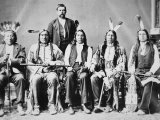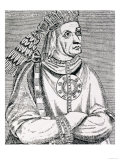
Sherman Alexie
Voices of Diversity poster series image no longer available
|
Sherman Alexie
b. 10-7-1966; Spokane, WA
Poster Text: “The word gone echoes all over the reservation. The reservation was gone itself, just a shell of its former self, just a fragment of the whole. But the reservation still possesses power and rage, magic and loss, joys and jealousy. The reservation tugged at the lives of its Indians... But the reservation forgave, too.” - Reservation Blues
“According to TV and the movies, Indians don't exist past 1950.” says Sherman Alexie, a Spokane and Coeur d'Alene Indian. Growing up, Mr. Alexie couldn't identify with the stereotyped images that he saw of Native Americans. Now Mr. Alexie is working to remove those stereotypes with is writing about modern Native Americans.
Sherman grew up in Wellpinit, Washington, the main community of the Spokane Indian Reservation. “I was a weird, nerdy little kid,” he says, and he felt isolated from the rest of the community. He spent a lot of time alone, reading. “I'd read the entire reservation library by the time I was 15,” he says. “I read everything I could get my hands on – cereal boxes, catalogues, instruction books, you name it.”
But even though books were very important to him, he almost didn't become a writer, He planned to study medicine at Washington State University, but changed his mind after he fainted three times in human anatomy class. So he enrolled in the only open class: a poetry workshop. the first assignment was to write five poems. “I went home and did it, and it hasn't stopped yet.” Those poems can be found in his first book poetry. The Business of Fancydancing, which was published in 1992. Since then, he has published a variety of works including. The Lone Ranger and Tonto Fistfighting in Heaven – a short story collection – and the novel Reservation Blues. He also wrote the screenplay for the film Smoke Signals, which was based on one of his short stories, and which was the first feature film written, co-produced, and directed by Native Americans.
Mr. Alexie's work often focuses on the harsh realties of reservation life – including alcoholism on poverty. “I'm not in [writing] to make people happy or to make people feel good about the world.” he says. “First and foremost, I want to talk about universal conditions.” But although his writing deals with serious subjects, it's also filled with humor. “Indians are funny, the funniest people on the planet,” he says, "They have to be."
• Voices of Diversity posters
• more Authors posters
|




















